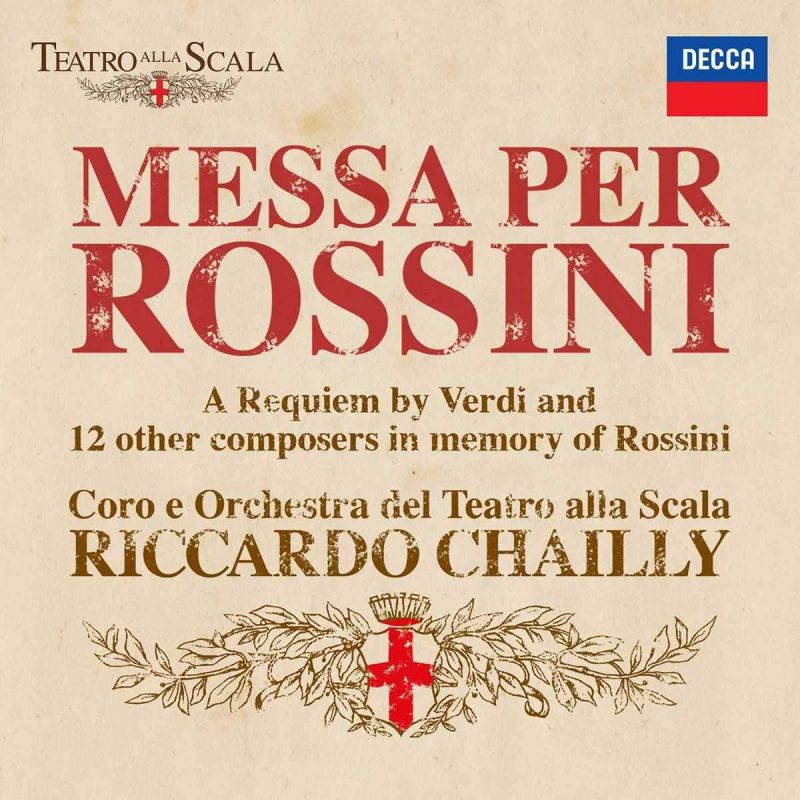Messa per Rossini (Chailly)
View record and artist detailsRecord and Artist Details
Composer or Director: Giuseppe Verdi, Raimondo Boucheron, Carlo Coccia, Antonio Bazzini, Alessandro Nini, Carlo Pedrotti, Antonio Buzzolla, Federico Ricci, Gaetano Gaspari, Pietro Platania, Antonio Cagnoni, Lauro Rossi, Teodulo Mabellini
Genre:
Vocal
Label: Decca
Magazine Review Date: 02/2019
Media Format: CD or Download
Media Runtime: 101
Mastering:
DDD
Catalogue Number: 483 4084DH2

Tracks:
| Composition | Artist Credit |
|---|---|
| Requiem |
Antonio Buzzolla, Composer
Antonio Buzzolla, Composer |
| Kyrie |
Antonio Buzzolla, Composer
Antonio Buzzolla, Composer |
| Dies irae |
Antonio Bazzini, Composer
Antonio Bazzini, Composer |
| Tuba mirum |
Carlo Pedrotti, Composer
Carlo Pedrotti, Composer |
| Quid sum miser |
Antonio Cagnoni, Composer
Antonio Cagnoni, Composer |
| Recordare Jesu pie |
Federico Ricci, Composer
Federico Ricci, Composer |
| Ingemisco |
Alessandro Nini, Composer
Alessandro Nini, Composer |
| Confutatis |
Raimondo Boucheron, Composer
Raimondo Boucheron, Composer |
| Lacrimosa |
Carlo Coccia, Composer
Carlo Coccia, Composer |
| Amen |
Carlo Coccia, Composer
Carlo Coccia, Composer |
| Offertorio |
Gaetano Gaspari, Composer
Gaetano Gaspari, Composer |
| Sanctus |
Pietro Platania, Composer
Pietro Platania, Composer |
| Agnus Dei |
Lauro Rossi, Composer
Lauro Rossi, Composer |
| Lux aeterna |
Teodulo Mabellini, Composer
Teodulo Mabellini, Composer |
| Libera me, Domine |
Giuseppe Verdi, Composer
Giuseppe Verdi, Composer |
Author: Richard Osborne
That first performance never happened, a victim of parish-pump politics and inter-city rivalries. Verdi’s own contribution, the ‘Libera me’, has come down to us (slightly altered) in his own Messa da Requiem. But the Messa per Rossini lay largely forgotten until its rediscovery in Bologna in 1970 by the American Verdi scholar David Rosen. Eighteen years later, it received its first performance: a joint initiative by Pierluigi Petrobelli, director of the Verdi Institute in Parma, and Helmut Rilling, director of Stuttgart’s Bachakademie.
The premiere, given in Stuttgart in September 1988, with Rilling directing his revered Gächinger Kantorei and five well-chosen soloists, was expertly recorded for Hänssler Classic by South German Radio. That remains available, in various more or less easy-to-acquire formats. And happily so, since I would be more confident commending this interesting choral curiosity to enquiring collectors in that Stuttgart performance than in the newer one from Milan.
Decca made the new recording in La Scala in November 2017, ahead of last year’s 150th anniversary of Rossini’s death: an admissible initiative under the terms of Verdi’s somewhat prescriptive brief! The principal problem is that, where Rilling and his choir are specialists in the preparation and performance of sacred choral music from Bach to Britten, via Verdi and others too numerous to mention, the operatically inclined La Scala forces are not.
And it shows, not only in something like Carlo Coccia’s a cappella setting of the ‘Lacrimosa’ but even in Verdi’s ‘Libera me’ (disappointingly led by the rising Uruguayan-born star María José Siri), where you would expect the La Scala chorus to have some familiarity with the music. I wonder, too, to what extent the Milan forces were fully engaged with the project. There are some memorable compositions here: Antonio Buzzolla’s brooding Introitus, Carlo Pedrotti’s superbly theatrical ‘Tuba mirum’, the high drama of Federico Ricci’s ‘Recordare’. But these all have more presence and atmosphere in Rilling’s performance. Where the Stuttgart musicians are alert to the music’s point and beauty, the Italians often seem merely dutiful. In all but two of the movements Chailly’s tempos are brisker than Rilling’s. This can be useful in the handful of contributions which, in one way or another, are frankly second-rate, but it is not so helpful elsewhere.
Chailly’s beautifully understated account with tenor Giorgio Berrugi of Alessandro Nini’s grossly over-inflated (not to say egotistical) ‘Ingemisco’ is preferable to James Wagner’s all-guns-blazing Rilling account. But that is an exception. Elsewhere, the Stuttgart performance is generally the finer of the two in terms of engagement, style and technique.
Discover the world's largest classical music catalogue with Presto Music.

Gramophone Digital Club
- Digital Edition
- Digital Archive
- Reviews Database
- Full website access
From £8.75 / month
Subscribe
Gramophone Full Club
- Print Edition
- Digital Edition
- Digital Archive
- Reviews Database
- Full website access
From £11.00 / month
Subscribe
If you are a library, university or other organisation that would be interested in an institutional subscription to Gramophone please click here for further information.




